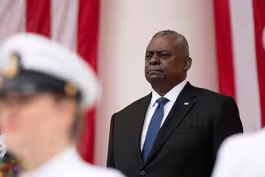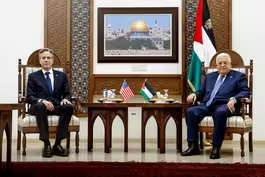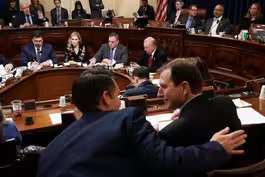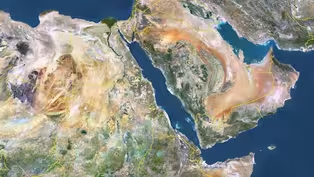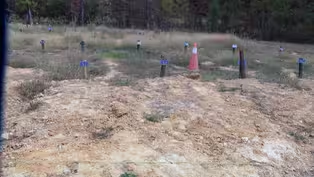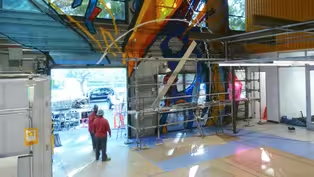
Experts address Israel-Hamas war's impact on children
Clip: 1/10/2024 | 8m 11sVideo has Closed Captions
How mental health experts are handling the Israel-Hamas war's lasting impact on children
The fallout from the Israel-Hamas war is far-reaching and the damage from the conflict will be felt for years. The Hamas attack on Oct. 7 and Israel’s counteroffensive have left thousands dead and caused immense physical destruction. It’s also left a mark on the collective psychology of an entire region, especially its children. William Brangham reports on a program trying to address the problem.
Problems playing video? | Closed Captioning Feedback
Problems playing video? | Closed Captioning Feedback
Major corporate funding for the PBS News Hour is provided by BDO, BNSF, Consumer Cellular, American Cruise Lines, and Raymond James. Funding for the PBS NewsHour Weekend is provided by...

Experts address Israel-Hamas war's impact on children
Clip: 1/10/2024 | 8m 11sVideo has Closed Captions
The fallout from the Israel-Hamas war is far-reaching and the damage from the conflict will be felt for years. The Hamas attack on Oct. 7 and Israel’s counteroffensive have left thousands dead and caused immense physical destruction. It’s also left a mark on the collective psychology of an entire region, especially its children. William Brangham reports on a program trying to address the problem.
Problems playing video? | Closed Captioning Feedback
How to Watch PBS News Hour
PBS News Hour is available to stream on pbs.org and the free PBS App, available on iPhone, Apple TV, Android TV, Android smartphones, Amazon Fire TV, Amazon Fire Tablet, Roku, Samsung Smart TV, and Vizio.
Providing Support for PBS.org
Learn Moreabout PBS online sponsorshipand the damage from the conflict# will be felt for years to come.
Hamas' attack on October 7 and Israel's# counteroffensive since have left thousands## dead and caused immense physical# destruction.
It's also left an## indelible mark on the collective psychology of# an entire region, and especially its c William Brangham has the story of a# program trying to address that problem.
WILLIAM BRANGHAM: The Binational# School of Psychotherapy launched## about seven years ago trains postgraduate# students to care f this in an area with seemingly endless conflict.
The trainees are a mix of Jewish Israelis,# Arab Israelis and Palestinians all together.
I recently spoke to the program's# two directors, Esti Galili-Weisstub,## who is a Jewish Israeli, and Shafiq# Masalha, a Palestinian Arab Israeli.
Thank you both so much for joining us today.
Obviously, it's impossible to encapsulate# everything that young people and seeing and experiencing in the midst# of this war.
But I wonder if you could## just talk a little bit about the kinds of# challenges that these professionals will## have to deal with trying to help children# who are living through this experience.
DR. ESTI GALILI-WEISSTUB, Co-Director, Binational# School of Psychotherapy: When children suffer## from extreme trauma, as they are, Their concentration is damaged,# so their intellectual abilities## are damaged.
Their ability to# create, their ability to imagine,## they are all damaged.
The anxiety# shows up as behavioral problems,## as problems with connecting with the others,# or with feeling safe, being able to enjoy play.
It's like basically having something of an iron## cast kind of stifling all your# mental and cognitive functions.
DR. SHAFIQ MASALHA, Co-Director, Binational# School of Psychotherapy: At this time in the war,## we are counting the number of people who are# dead or injured, but we do not idea now about the psychological harm that's# going on and that will show itself very soon.
I'm very afraid that the next generation of the## Palestinian people in Gaza will be# really suffering from this trauma.
WILLIAM BRANGHAM: As the war grinds# on, Masalha and Galili-Weisstub have## continued the program remotely.
Both# Israeli and Palestinian students have## also kept working in their communities, even# though some have lost loved ones themselves.
There are two trainees living in Gaza,## and the directors have had only# sporad DR. SHAFIQ MASALHA: In the beginning,## at least in DR. ESTI GALILI-WEISSTUB: Physical# needs, physical immediate needs.
DR. SHAFIQ MASALHA: Yes.
have a different language even when they talk# to people around, to children around.
I mean,## it's a different attitude.
So even# if they don't do pure clinical work## during times of war, their language# is different and there's influence.
DR. ESTI GALILI-WEISSTUB: Because the number of# people that are exposed to trauma or experiencing## immediate threats is so large, we don't have the# ability for meaningful one-on-one ongoing therapy.
So, mostly it's group intervention,# parent guidance, some one-on-one crisis## intervention.
It's not actual therapy.
But# even those small interactions are meaningful,## because they are aimed to strengthen the# child or the adolescent, support his family## and to give them a little bit of hope and# understanding that it is a process.
And,## hopefully, they will come out of the# other side, just saying you're not alone,## we're trying to listen to you,# we're trying to do the best we can.
The situation, as Shafiq said in# Gaza, is in a different scale,## so there is no ability but to deal, and I don't# know exactly how they do it, with communities.## But we really hope that better days will come# and we will be able to offer therapy again.
DR. SHAFIQ MASALHA: Most people interviewed# talking about this war and the Palestinian-Israeli## conflict, they talk in historical or political# terms.
And very few talk in psychological terms.
Like, there are two people who are traumatized,# who are acting from the place of trauma,## feeling under threat all the time, feeling anxious# all the time, feeling that their existence is in## danger.
So this is exactly what happens to# the individual who is suffering from trauma.
We believe, if there were two# individuals, we would be able## much more to help them.
But because it's# a mass psychology, it's more difficul WILLIAM BRANGHAM: The directors also believe# that, by bringing Israeli and Palestinian## practitioners together, they can help two# traumatized communities start to heal.
DR. ESTI GALILI-WEISSTUB: We really believe# that by strengthening the empathic ability## to the other is our only hope to ever# bridge and build something together.
If you look into in-depth psychology, the# importance of being empathic to parts that## are difficult are the most important part# of the therapeutic process.
But, here,## I must say that it is almost physically painful to# sit and to realize how hard it is for the other,## and at the same time being scared and being# worried and being ashamed and being angry and## being, I think, all the myriad of feelings that we# have to deal with as students and as supervisors.
Right now, the emphasis is on relating to the# others, even in times of war, realizing that we## are going to share the same piece of land, so# relating to the other is actually our future.
DR. SHAFIQ MASALHA: Our students have# -- especially the Palestinian students,## have to cope with a lot of resistance in## their communities joining a joint# group of Israelis and Palestinians.
They live in a very small piece of land,# but they live with a lot of boundaries,## physical boundaries of meeting each# other and psychological boundaries.## So they really don't know each other# as human beings.
There's a lot of## dehumanization.
The other is an enemy.
You# know, I can't talk to the other person.
So this is the feeling of the vast# majority of both sides.
So, in this case,## we created an island, I think, that, within the# last 20 years, I believe that there's not such## a place where Palestinians and Israelis equally# go through the same program and meet each other.
And they have a group process that helps# them to process their own relationships.## It's not only learning material, but we# need to create more events like this.
WILLIAM BRANGHAM: All right, Dr. Shafiq# Masalha and Dr. Esti Galili-Weisstub,## thank you both so much for talking with us.
DR. SHAFIQ MASALHA: Thank you.
DR. ES
Austin's diagnosis highlights stigma around prostate cancer
Video has Closed Captions
Clip: 1/10/2024 | 5m 13s | Defense secretary's diagnosis highlights stigma surrounding prostate cancer (5m 13s)
Blinken urges Palestinian Authority to govern Gaza after war
Video has Closed Captions
Clip: 1/10/2024 | 4m 6s | Blinken urges Palestinian Authority to show it's ready to govern Gaza after war (4m 6s)
House Republicans poised to impeach DHS Secretary
Video has Closed Captions
Clip: 1/10/2024 | 6m 30s | House Republicans poised to impeach DHS Secretary over problems at southern border (6m 30s)
Houthi rebels launch attacks on ships in Red Sea
Video has Closed Captions
Clip: 1/10/2024 | 8m 50s | Houthis launch largest drone and missile attack targeting ships in Red Sea (8m 50s)
Hundreds of bodies found buried behind Mississippi jail
Video has Closed Captions
Clip: 1/10/2024 | 7m 28s | Families in disbelief after hundreds of bodies found buried behind Mississippi jail (7m 28s)
Quantum computing lab transformed into artistic oasis
Video has Closed Captions
Clip: 1/10/2024 | 5m 30s | Why Google transformed a quantum computing lab into an artistic oasis (5m 30s)
Providing Support for PBS.org
Learn Moreabout PBS online sponsorship
- News and Public Affairs

FRONTLINE is investigative journalism that questions, explains and changes our world.

- News and Public Affairs

Amanpour and Company features conversations with leaders and decision makers.












Support for PBS provided by:
Major corporate funding for the PBS News Hour is provided by BDO, BNSF, Consumer Cellular, American Cruise Lines, and Raymond James. Funding for the PBS NewsHour Weekend is provided by...

